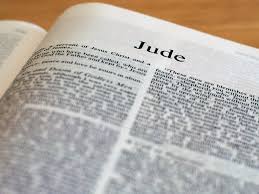"Once for All Delivered to the Saints" -- Jude 1-4
 Tuesday, June 28, 2016 at 10:35AM
Tuesday, June 28, 2016 at 10:35AM  The First in a Series of Sermons on the Epistle of Jude
The First in a Series of Sermons on the Epistle of Jude
It should get our attention when we are reminded of the number and gravity of the warnings to the churches found in the New Testament concerning the threat of false doctrine and false teachers. In the Epistle of Jude, we learn of churches which have been secretly infiltrated by self-appointed spokesmen for God, who were advocating the quite erroneous notion that because we are saved by God’s grace, we are no longer bound to follow God’s commandments. Such false teachers claimed to be followers of Jesus, while at the same time were themselves engaging in all kinds of sexual immorality closely tied to the paganism of the age. By indulging in sins of the flesh, under the guise of God’s grace, Jude says, these teachers were actually denying the gospel of Jesus Christ. Aware that this was going on in the churches, Jude writes a short but very powerful exhortation to Christians in these churches to oppose these false teachers with everything in them. Jude exhorts them to “contend for the faith once for all delivered to the saints.”
We begin a three-part series on the Epistle of Jude–one of the shortest epistles in the New Testament. Jude is the brother of James and half-brother of Jesus. In fact, based upon the list of Jesus’ brothers in Mark 6:3 and Matthew 13:55, Jude is probably James’ younger brother. Having completed a series on both epistles of Peter, and now aware of the literary connection between Peter’s second epistle and Jude, we are in a good position to consider the short epistle of Jude, who leaves us one of the most often-quoted but least practiced exhortations of the New Testament: “Contend for the faith that was once for all delivered to the saints.” In a perilous age such as ours, when far too many Christians are ignorant of the most basic of Christian doctrines, and therefore all too prone to compromise with the paganism all around us, Jude’s exhortation to contend for the faith ought to ring in our ears.
Although the author of this book is the brother of James–who wrote his epistle in the mid-forties of the first century–many argue that Jude was written as much as twenty years after the Epistle of James. This would give us a date of composition somewhere in the mid-sixties, although I think a good case can be made for a much earlier date (the early 50's). If the exact date of this epistle is somewhat up in the air, it is very clear that Jude is writing under a completely different set of circumstances than those facing his brother James. For Jude, the issue which prompts the writing of this epistle is that Christians are under the assault of deceptive false teachers. Christians receiving this letter from Jude are exhorted to wake up and resist those deceivers who had secretly infiltrated their churches. At the same time, Jude’s readers need to make every effort to build themselves up in the most holy faith–perhaps the best defense against false teachers seeking to exploit doctrinally ignorant Christians.
The internal evidence points us in the direction that Jude is writing in opposition to a group of schwarmerai (charismatics), men, who under the pretense of receiving new revelations from God, were defiling their flesh (a reference to sexual immorality), and speaking blasphemously about matters which they claimed to understand, yet knew nothing about. This is very much like the second chapter of 2 Peter. It is clear from Jude’s comments that he is concerned about false teachers already in the churches, men whose conduct in many ways mirrors the false teaching plaguing the church in Corinth (2 Cor. 10-12), as well as two of the churches mentioned in Revelation (Thyatira and Pergamum) which, according to the Apostle John, were facing a similar kind of false teaching associated with a certain “Jezebel.” Based upon comments made by Jude, a good case can be made that the congregation(s) to which Jude is writing were steeped in Jewish mysticism, and plagued by end-times speculation (Jewish apocalypticism). It may be the case that the false teachers were able to appeal to the congregation’s interest in mysticism and end-times as a cover so as to make rapid progress in infiltrating the churches.
To read the rest of this sermon, Click Here


Reader Comments